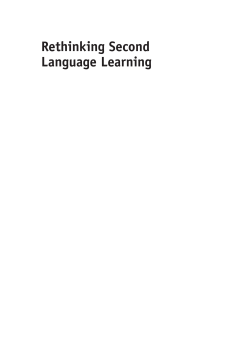
Additional Information
Book Details
Abstract
This book evaluates a project where formal classroom learning of a second language was supplemented with informal, natural interactions with older native speakers of the target language, delivering a number of pedagogical and societal benefits. The authors introduce a model of intergenerational, intercultural encounters which aims to promote the use of community language resources; enrich the experiences of young learners; foster greater understanding between generations; break down cultural stereotypes; encourage appreciation of different cultures and enhance the quality of life and community engagement of older people with a bi/multilingual background. It draws on theories of language acquisition, discourse analysis and psychosocial perspectives to propose a model of language learning for students that can be used for any language or locality. It is therefore an essential resource for graduate students, researchers and language teachers as well as for education, aged and youth care policy makers, practitioners and community services workers who are interested in innovative language pedagogy.
One of the challenges for language study and revitalisation has been generational connections: users and learners, speakers and acquirers, cultural insiders and entrants. Few studies have systematically investigated these critical relationships and their effects on learning, identity and community formation. This book is an important instalment in how to validate and benefit from intergenerational community resources, giving meaning and depth to the adjective 'community' or 'heritage' qualifying the noun ‘languages'.
The project this book presents is a rare and beautiful combination of high-quality inter-disciplinary research coupled with a genuine desire to foster cross-cultural and intergenerational understanding in an innovative model of socially inclusive second language learning.
This deeply humane and well-informed study of students learning a new language from older adults of other cultures has broad implications for education, research and social policy. It shows how one human interaction at a time can enrich individuals' development, bring people of different ages and cultural backgrounds into mutually supportive relationships and, ultimately, create an inclusive society.
Marisa Cordella is Associate Professor in Spanish Linguistics at The University of Queensland, Australia. Her research expertise lies in the areas of discourse analysis (e.g. critical discourse analysis, interactional sociolinguistics), intercultural and intergenerational communication, teaching methodologies, medical communication and translation studies. She is the author of two books on discourse analysis and medical communication.
Hui Huang is Lecturer in the School of Languages, Literatures, Cultures and Linguistics at Monash University, Australia. Her research interests and publications cover the areas of second language acquisition and sociolinguistics, particularly the teaching of Chinese as a second/heritage language, ICT in language teaching, cross-cultural communication and immigrant identity.
Table of Contents
| Section Title | Page | Action | Price |
|---|---|---|---|
| Contents | vii | ||
| Figures and Tables | ix | ||
| Transcription Conventions | xi | ||
| Acknowledgements | xiii | ||
| Contributors | xv | ||
| Introduction | xix | ||
| Part 1 Setting the Scene: Many Cultures, Many Opportunities | 1 | ||
| 1 The Immigrant Potential: Multiculturalism, Language Skills and Community Resources | 3 | ||
| 2 Contemporary Intergenerational Relationships | 25 | ||
| 3 Community Resources on our Doorstep: Language Learning in Action | 37 | ||
| Part 2 Constructing Identity: The Self-Presentation of Older Native Speakers | 49 | ||
| 4 Taking a Stance: Older Native Speakers with Young Language Learners | 51 | ||
| 5 The Migration Experience and the Ethos of Self | 66 | ||
| 6 ‘Who Are We?’ Self-Referencing in Chinese and German Conversations Using the First Person Plural | 85 | ||
| 7 Creating, Maintaining and Challenging Rapport Across Languages and Age Groups | 110 | ||
| 8 ‘I feel very happy that I can contribute to society’: Exploring the Value of the Project for Older People | 149 | ||
| Part 3 Situated Learning: Enhancing the Opportunities for L2 Students | 169 | ||
| 9 Gaining L2 Self-Confidence in Conversations with Native Speakers | 171 | ||
| 10 Developing Interactional Competence in Dyadic Conversations: Cross-language Evidence | 187 | ||
| 11 An Innovative Model for Second Language Learning and Social Inclusion | 226 | ||
| Index | 239 |
